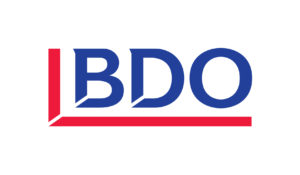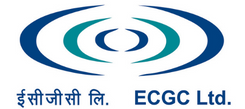The Council of EU Chamber of Commerce in India (EU Chambers) organized a panel discussion and presentation on “Union Budget 2023 & its Implication” on Thursday 2nd February 2023 at Taj Mahal Palace, Mumbai.
Excerpts from Captain Avinash Batra, Past President of EU Chambers and Chairman, Seahorse Ship Agencies Pvt. Ltd.
Capt. Avinash Batra, welcomed all the guest. He also extended a warmly welcome to the distinguish panelist who has spared the time to be here and will share their experience and valuable advice with us. He welcomed Mr. K V Bala, Founder, Indus Finance, Mr. Khurshed Dordi, Managing Director and Group Chief Operating Officer, India, Deutsche Bank AG, Mr. Chris Devonshire-Ellis, Chairman, Dezan Shira & Associates, Mr. Siladitya Sarangi, Country Manager, Deoleo India Pvt. Ltd., Ms. Rajani Sinha, Chief Economist, Care Ratings Limited, Mr. Pranay Bhatia, Partner -Tax & Regulatory Services, International Liaison Partner, BDO India and Ms. Payal Thaker Partner – Indirect Tax, BDO India. While introducing EU Chambers he mentioned that the Chamber was formed in 1992 under ages of European Union ambassador in India and also consist of members of the European Union bi-lateral committee, bi-national committee and business leaders from Indian and European companies. The main focus and the purpose of EU Chambers is to promote and foster relation between European and Indian companies and to promote culture and also assists companies to have a foothold in Europe while establishing new relations, new contacts and new businesses. He further admitted that the Chamber has been very successful and today the Chamber has a very large membership of Indian and European companies.
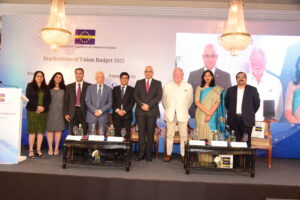
Mention about the topic he said that is a tropical subject, a subject that has been a matter of large debates in the last few days. He did not comment on the Budget as there are professionals who will do that. He said that budget has enhance the capex to ensure that there is enough available for promoting the Modi Government’s efforts and priorities on building infrastructure
be it be roads, highways, railways or any other part of infrastructure and the ministry has also been consistent in maintaining deficit budget for 5.9% which is something that he thinks the traders welcomed and it has also brought relief to big companies, mid-level companies and has also provided sufficient benefits to low income as well as middle class as well as to pensioners.
Excerpts from the speech of Dr Renu Shome, Director at The Council of EU Chambers of Commerce in India,
She joined Capt. Batra in welcoming all the guest. She officially welcomed the Consul General of Finland who has recently resumed his duties and is new in Mumbai. She also welcomed the newly appointed Consulate General of Turkey, South Africa, and representatives from Consulate of Argentina, Germany, Spain and the Czech- republic trade office.
While explaining the structure of the organization she mentioned that the Chamber consist of a Chief Patron who is the EU Ambassador in India, Bi-lateral Chamber, Bi-national Business Committees, European and Indian Companies. Over the years, the Chamber has inclusion of Sector Committees and Advisory Board in its structure. She further mentioned that the President of the Chamber is Mr Peeyush Kaushik, Vice President – Business Leader & Head Healthcare Innovation Centre, Philips India Ltd. and the Vice – President is Mr. Rajeev Sharma, Country Managing Director, G4S India. She briefly introduce the other Governing Board Members of the Chamber for FY 2022-23. Dr Shome explained how the Chamber is supporting its companies by organising various activities such as B2B, B2G etc. and help companies in market visibilities. One of the strength of the Chamber is that it supports the companies in any kind of business opportunities be it European companies counting for the opportunities in India or Indian Companies looking for opportunities in Europe.
The Chamber works very closely with the central and state governments as well as various Chamber of Commerce and has signed MOU’S with these organizations. With such associations, the Chambers has supported its member companies and assisted them in their business. The Chamber does not only have Indian partner but has also signed MoUs with various international associations from countries such as Bulgaria, Croatia, Denmark, Hungary, Ireland, Latvia, Poland, Romania, Slovenia and Slovakia. The Chamber is headquartered in Mumbai and has membership across the country and so the current board of the Chamber is keen to expand in different regions of the Country because the members of the Chamber feel that most of the activities are conducted in Maharashtra although the Chamber has already started doing a lot of activities in different region so expansion is very much on card. The Chamber is in the process of opening offices in atleast three regions such as the western, eastern and southern region because the Chamber does have an excellent database of members in these regions.
She further elaborated on the various sector committees of the Chamber that were formed with the intention of serving the members of the sectors and making proper representation of those sectors to the government. She further stated that the Chamber has various sector committees such as Automobile, Banking and Financial Services, Education, Engineering, ICT, Legal and Regulatory and this year the Chamber has introduce two more committees namely Pharmaceutical and Healthcare and Sustainability.
She further mentioned that total membership of the Chamber is 885+ of which 120 are Life Members, 167 are European companies and 598 are Indian companies, these Indian companies
are the companies who have interest to either enter or deal in/ with European Market. In addition, the Chamber also has 10000+ total number of contacts.
She ran through the activities organized by the Chamber during the year. She also mentioned that recently the Chamber had participated as an international partner in the Global Investor Summit organized by the state of Madhya Pradesh, Uttar Pradesh and Andhra Pradesh where the Chamber brought delegations of various European Companies from Europe. Not only the Chamber signed MoUs with the government but also few of the European Companies also simultaneously signed MoUs with the government. Lastly, she also spoke about the publications that EU Chamber provides such as MECR, E- newsletter Bi-monthly magazine called Business Pulse and Members directory etc. and requested the attendees to take advantage of these publications.
Excerpts from the speech of Mr. Pranay Bhatia – Direct Tax – Partner – Tax Regulatory Services, International Laison Partner, BDO India.
Mr. Bhatia began by thanking EU Chambers for giving the opportunity to be the knowledge partner and presented the budget proposal, which was announced by the respective finance ministry. He began with personal tax, which is relevant for almost everyone. He mentioned that the focus of the budget that was presented was to get everyone to move to a new tax regime that’s why the policy makers is trying to give a better or a sweet deal in terms of new taxes which are proposed. He mentioned that there are some aspects, which are not very favorable. Talking about the old tax regime vs new tax regime for individual taxation he said that we have always heard advisors talking about investing in insurance and mediclaim for the purpose of deductions in tax under the old tax regime but according to the new tax regime a person will have to forget deduction and pay taxes on a flat rate. Hence, all the investments are going to go away from the tax bracket perspective.
He touched upon some of the major changes like the reduction of super rich tax such as the surcharge from 37% to 25% effectively brining the highest slab of tax rate from 43% to about 38-39%, which is apparently a great thing. He also explained two reasons why this reduction was required, one the rate of 43% was high as compared to most countries in the world and the countries where this tax rate of 40+ exists, there the people were getting some social services, which is missing in India because of the gap between number of people living and the number of people paying taxes is too huge. So the taxes paid by an individual is going only for the nation building and no other benefits is coming to any individual. Therefore, this rate was to be rationalized and the second reason for the change in rate is that in last 2-3 years and especially during pandemic lot of people migrated out of India and shifting their base outside of India. Therefore, this is an attempt made to stop the migration and to make the super-rich to feel that the rate is not so bad. So the policy makers have reduce the rate effectively from 43% -38% which is a topline 4 % reduction.
Some rebates have also been increased in the new tax regime. Its important to understand that only if the super-rich is paying tax under the new tax regime he is entitled to claimed the reduce surcharge rate. He believes that the super-rich would anyway not opt for deduction, as deductions are very limited. There is a standard deduction available for salaried employees in the new tax regime of Rs. 50,000/- which is again a welcome.
Moving to corporate taxation, he mentioned one of the important thing is that there is no change to the tax rates or tax structures for the corporates, which he thinks, is a big welcome. So be it a foreign company or Indian company, a partnership or a LLP there is no change to the tax rates which is one good thing. He explained some of the other changes from corporative perspective, which might not be that relevant because the budget announced did not have any big bang changes in the corporate taxation. There were changes in the presumptive taxation for professional and for companies where the limits have been increased, which is again welcomed. One very important change, which has come around, is the policy makers wanting to give more and more support to micro and small medium enterprises. So if a company is dealing with MSMEs and the company is unable to clear the dues of the MSME in time; it will be put in par with the statutory due so that company will not get the deductions in the year which the company failed to pay the tax. The deductions can be claimed in the subsequent year when the actual payment was made. So there will be an impact on tax liability as well. So there are 3 aspects that will turnout one a company needs to keep track on what are the payments and whether the payments are being made with the prescribed limit of 45 days which is prescribed by the MSME Act. If the payment is not made within the prescribed time limit, the auditor is going to ask the company to report such payments in the financial because it needs to be reported in the financials. The tax auditor will also mention that the deduction cannot be claimed in this instead it will be claimed in the subsequent year. Which is again an important change for MSMEs which has been proposed. Another important changes that has been is for the startups, deduction for all the startups are available only if they are set up before March 2023 has been extended by a year making it March 2024. Another change is that carry forward of loss also allowed in the case of 10 years window as against a 7 year window. These changes are welcomed by the startups. Typically what happens is when a startups is being built it raises more and more capital and if the share holding is changed by more than 50% then the startup will lose the carry forward. However, there is a special protection available that even if the shareholding changes beyond 51% the startup will not lose carry forward process, it is again a great initiative.
He further explaining the non- resident tax, he said its important to understand that why at first place the angel tax was brought in. He mentioned that an angel tax was brought because lot of investors were investing in a company at a substantial premium and there was anxiety whether it was the right thing to do, whether one should pay so much premium or not pay so much high premium. What is the objective and so on creating uncertainty. So a provision was introduced way back in the Income Tax, where a resident company received money from any other resident for shares at a premium and if the Indian company doesn’t have adequate valuation to justify the premium then the excess premium will taxed in the hands of the company because it is more than what the company should have received as the value of the company. But here always the foreign investors were excluded from this provision, so in case a foreign investor he/ she should always invest in a company at a premium because even the FEMA regulatory says the same. But the new tax regime allows foreign investors to invest in companies at the face/ value and the excess if any, invested will be taxable in the hands of the Indian Company. Talking about other changes, he mentioned that when a foreign company undertaking projects like exploration there is a presumptive taxation that the income tax will be taxed at flat 10% and the effective rate is 40% on the foreign companies and 4% is the topline tax that the company needs to pay.
However some companies when they began to incur losses they mentioned that they were not covered under the presumptive taxation subsequently they started making profits and were not claiming set offs of these losses and were paying 4% tax. So now they will have to claim set of those losses which has now been introduced in the budget.
Speaking about the others key amendments, he said that there is a new section that is introduced for the taxation of the online gaming winnings and how the withholding of the tax has to be done. When the money is won, now the online gaming company who is giving the platform will now with hold the tax and also the player has to report the winning that has been done. Suppose a user is playing on multiple platform each platform will with hold the tax till year end and the player needs to consolidate the winnings from each of the platform and report it. All the winnings needs to be taxed at a flat 30% and no deductions are allowed for the losses. So incase someone wins Rs. 10,000 and looses Rs. 12,000/- he still has to pay taxes on the Rs. 10,000/- won.
Mentioning about the TCS, he said that the tour operator on behalf of an individual will collect the tax and pay under the PAN of an individual and that individual can take credit of such taxes collected. Any income under the liberalized remittance will suffer a flat 20% TCS. There are also important changes in time to furnish the Transfer Pricing report. There are also lot of procedural changes in terms of time limit for completion of assessment introduced in the proposed budget. He ended with stating there were a lot of procedural changes made in the budget and there were also few important changes made, making the budget presented a unique one.
Excerpts from the speech of Ms. Payal Thaker, Partner- Indirect Tax, BDO India
She began with referring the lines of the Hon’ble Finance Minister during her budget presentation that “the thrust is on Green Energy and Infrastructure Development in the Country”, the proposal that have come across in the indirect tax are align to these lines of the Finance Minister especially on the customs front. Explaing about the changes in the GST, she mentioned that largely is such changes come through the GST council meeting but there are certain law related changes, which come through the budget. She mentioned that the first and important change that has been introduced is in the input tax credit provision where the budget has curbed the availament of input tax credit for any good and services that are being used to carry out CSR responsibility. This is something which is to be done under the law and ideally because it’s a business-related activity and the expenses incurred should be available but somehow the assesses have been debarred from availing this credit. This provision is going to be effective when the financial budget receives the accent.
The other change is the amendment to the definition of the exempted services for the purpose of reversed of tax credit. When an inbound sale is done outside the territory of India; on the custom frontier is included in the exempt turnover for the purpose of availment of input tax credit. Incase a company is not paying its vendors the value of services and GST amount, the company is required to reverse the credit that it has availed and those provisions are already there in the laws but it has been aligned and amendment to match the return filing format.
She added that there is concept called as place of supply under the GST law which help to determine which state is eligible to get the GST revenue on the basis of place of supply. There have been some minor changes in this provisions especially in the case of the transportation of the goods outside India were supplier and receiver of the services are located within the country. Earlier the location of were the goods were getting delivered were considered but now in case of B2B supply it is the location were the recipients is situated and in case of B2C supply it is the location were the goods are handed over for the transport . There are certain provisions, which are amendment especially in case of penalty and offences. The threshold have increase for criminalizing or initiating a prosecution, which was Rs. 10 million earlier, and now it has been increases to 20 million. There has been certain relaxation such as criminal prosecution would not happen in certain case where an officer is prevented from discharging his duties or where some evidence has been tampered with. Apart from these above changes there are also certain changes in compounding penalties and offences. Certain provision were also introduced under the schedule of the GST Act which were effective from 2019 they are now made applicable from 1st July 2017 which is the day GST was implemented in the country. The first changes is when there is supply of goods outside the country where the supplier and received both are located outside the country is included in the schedule which determine the activity which is not the supply and which does not come under the GST amebic. Also in case of inbound sale were there is high sea sales it is also a part of the schedule which helps to determine activities which are non- supply activity. This provision was implemented from 2019 but there has been retrospective amendment from 1st of July 2017. She further continued we all know there has been announcement in the budget that the document will be freely available between various government agencies and accordingly the relevant provisions are amended under the GST Act.
Talking about E-commerce operators she mentioned that they were earlier not penalized for any error of the vendor who was registering on their portal and carrying the supply activity but now the E-commerce operator will be liable for a penalty of Rs. 10,000 or an amount equivalent to the tax. Other essential amendment is for online information and data base access and retrival services, under the GST law a supplier of these services even if located outside India and have people availing those service in India and are not GST registered the online service provider was supposed to register in India and follow the GST compliances. Another amendments defines the constitution of online database access and retrival service provider; there was a requirement of minimal human intervention but now that requirement has been done away with, so any kind of internet services provided will be classified under this section.
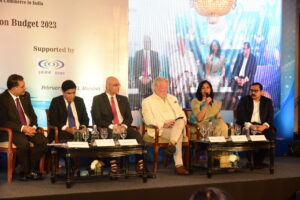
The customs law has come up with many changes, which is aligned with the government’s seven pillars or thrust. The customs law says that any kind of conditional exemption granted to industry will have a sunset clause, which will be 2 years from the end of the financial year for which exemption is granted. This provision is restricted to the Basic Customs Duty. There have been lot of amendment on rate front under the Customs Tariff Act and the rates have been rationalized and calibrated as per requirements or the thrust sectors like the green energy sector or the infrastructure sector those sector have received beneficial rates and the other sectors like the automobiles the rate have been increased which has been largely aligned to the theme of the budget.
She concluded mentioning about an important and critical change in the electrical vehicles sector where there is a concession for manufacturing of lithium iron batteries which will boost
the EV industry in India. The excise duty on CNG is exempted on the component, which is equivalent to the GST, which added to the base.
The presentation of the Union Budget by Speakers from BDO India LLP was followed by an insightful Panel Discussion on the “Implications of Union Budget 2023”. Mr. Pranay Bhatia moderated the Panel Discussion and the esteemed speakers were Mr. Khurshed Dordi, MD & Group COO, India, Deutsche Bank AG; Mr. Bala Venckat Kutty, Chairman, Indus Finance Ltd., Mr. Chris Devonshire – Ellis, Chairman, Dezan Shiran & Associates, Ms. Rajani Sinha, Chief Economist, Care Ratings Limited and Mr. Siladitya Sarangi, Country Manager, Deoleo India Pvt. Ltd.
Mr. Khurshed Dordi, spoke on how bringing in capex expenditure which has grown by 33% is going to bring in lot of investments, boost to the economy, create new employments etc. He further said that setting up a good transport system is going to improve connectivity and will involve lot of finance resulting to fresh investments. He also mentioned that KYC procedures are very painful and unfortunately, the laws are structured in a very fragmented way, hence there is a need to streamline these procedures. He said that when a company enters India, that company has to face a lot of documentation procedure. Policy makers are talking about ease of business, bringing down compliances making things simpler, making things digital but the reality is that even today we need to take hard copy of so many documents which is again not only eco-unfriendly but also a waste of time and frustrating to both the parties. In his opinion, there is a need to bring out various law that will make business procedures simpler.
Mr. Bala Venckat Kutti, mentioned that the budget at macro level is not bad as it talks about green industries growth and governance. He mentioned that the budget really gave a push for starting a digital farm or digital MSMEs which is opening up innovation start-ups. He states that the agriculture fund, agriculture credit limit and MSMEs credit guarantee scheme substantially increased and also there is 1% interest rate concession for MSMEs and agriculture. He also mentioned that there is a good direction and lot of good points introduce by the budget, which
will bring various changes in farmers approach, food processing, for the distribution of food and may have “one nation, one policy” and more and more resources will be available for rural areas.
Mr. Chris Devonshire – Ellis, said that the IMF released figures on 1st February (yesterday) which indicated China and India would be drivers for the world for this year as the west is sadly lacking behind. He further briefed about the western countries economy and he said that Indian investors should considered to be a domestic market. He said that the budget has turned out to be good, and its framed keeping in mind a country like India, which is driving the world. He further mentioned that still there are certain paperwork’s and policies that can be a relaxed when it comes to ease of doing business, especially for a foreign company.
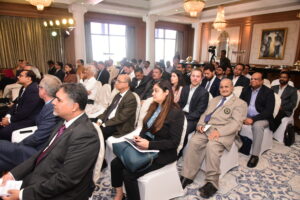
Ms. Rajani Sinha, mentioned that Indian economy is just recovering from the pandemic, global economy which has been mentioned is going through slowdown. It was important for the Finance Minister that we should not go wrong anywhere in budget. The budget firstly gave a big boost to capex investment, which was much required, secondly it gave a required push to consumption, India is a consumption lead economy so with the budget minor tricks were done in income tax. Lastly, budget has touch upon other relevant things such as it has spoken about green growth, youth empowerment etc. She was of the view that as far as growth of 7% is concern for FY 2023 she feels it’s quite achievable she also added that today, the kind of growth number we have for the first two quarters we can’t expect that we will be able to reach GDP growth of around 7%. In addition to this the projection of around 6.9% which is pretty much close to 7% really supported Indian economy in 2023. She said it really affected the services sector and manufacturing in the first two quarters. She gave her opinion about the moderated growth rate in FY 2024 she stated two reasons first being lot of pent up demand that was seen this year is going to fiscal out she further said that the second reason is the external sector will slow down and hence there is an expected growth of around 6%.
Mr. Siladitya Sarangi, mentioned that the continue push that we are seeing in the infrastructure since the last budget is really important and there is a need to drive it as it is still not sufficient with current logistics and supply chain available. He said that a lot of efforts has been put in the agriculture sector. The government has also doubled the pharma income under which lot of activities are taking place and for a long period of time. He particularly said that in this budget the credit system is going to help the farmers in a big way and with the cold-storage facilities and whole store facilities the government is helping in food services sector.
The event was concluded with Lunch and saw good number of participation.

